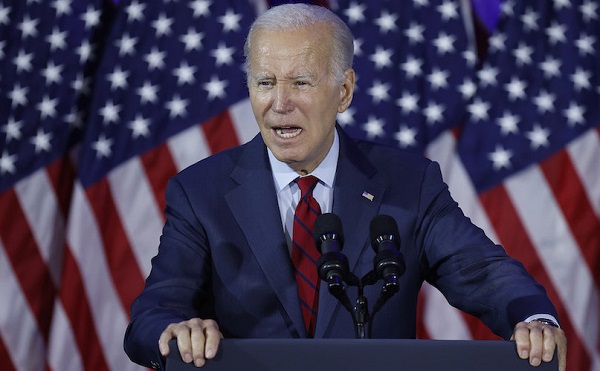Education
Catholic school board members oust fellow trustee for opposing LGBT agenda, talking to media

From LifeSiteNews
One of Monique LaGrange’s fellow trustees said she ‘violated the Trustee Code of Conduct by speaking to the media about what the Board did and about gender ideology.’
A Canadian Catholic school trustee opposed to extreme gender ideology and who compared the LGBT agenda targeting kids to that of “brainwashing” Nazi propaganda has been “disqualified” from her position after her fellow board members voted her out because she spoke to alternative media.
On Tuesday, the Red Deer Catholic Regional Schools (RDCRS) board of directors voted 3-1 to disqualify Trustee Monique LaGrange. As a result of being voted out, LaGrange later resigned from her position.
LaGrange’s lawyer, Alberta-based attorney James Kitchen of Liberty Coalition Canada, told LifeSiteNews that the RDCRS voted to kick her out “pursuant to section 87 of the Education Act (disqualification).”
Kitchen said that one of LaGrange’s fellow trustees “submitted a second complaint that Monique had violated the Trustee Code of Conduct by speaking to the media (specially Laura-Lynn and Talk Truth) about what the Board did and about gender ideology.”
On September 26, the RDCS passed a motion to mandate that LaGrange undergo “LGBTQ+” and holocaust “sensitivity” training for her social media post.
One of her fellow trustees had complained that because she spoke to the media against gender ideology, after she was ordered to undergo the training, she should be “disqualified.”
LaGrange said that her being disqualified shows that “Alberta has an abuse of power happening, beginning at the lowest level of politics,” in comments made to alternative non-legacy media.
She added that she hopes her removal “motivates Albertans to step up and replace these woke boards in our province.”
LaGrange said she will continue to “move forward and defend our families, our children and our freedom.”
LifeSiteNews contacted LaGrange for additional comment and will later provide more information on her ousting.
In a media statement yesterday, the RDCRS said that LaGrange had violated “sanctions issued on September 26, 2023, and further violations of Board Policy and the Education Act.”
“As a result of the disqualification, as per Section 90 of the Education Act, LaGrange resigned from her position this morning. Effective today, Mrs. LaGrange is no longer a member of the Red Deer Catholic Regional Schools Board of Trustees,” the RDCRS noted.
The RDCS did not specify which sanctions LaGrange had violated.
LaGrange initially came under fire when she posted to social media in September an image showing kids in Nazi Germany waving swastika flags during a parade, with the bottom of the post showing an image of kids waving LGBT “pride” flags along with the text, “Brainwashing is brainwashing.”
After her post went viral, calls for her to step down grew from leftist Alberta politicians and others. This culminated in her removal as director of the Alberta Catholic School Trustees’ Association (ACSTA).
LaGrange was elected in 2021 and said about being kicked out of the ACSTA that it was “unfortunate that ACSTA decided to make a rash decision to remove me, refusing to acknowledge that the heart of my message was to protect our children and to nourish their God-given identities.”
LaGrange to fight her removal
Kitchen told LifeSiteNews that as far as the next steps for LaGrange, they are looking to have her disqualification reviewed by a court.
They want a “Judicial review application to the Alberta King’s Bench,” Kitchen said.
“We will be doing that here in December,” he said.
When it comes to LaGrange’s social media post, which has been removed, she said that the post was about protecting kids, not hurting them, saying her meme was “centered around indoctrination and how children are vulnerable to evil agendas (agendas coming from organizations like Planned Parenthood, the UN or SOGI 123) filtering through culture.”
“This meme is not comparing or attacking the LGBTQ community, it is about protecting our children and keeping parents as the primary educators,” she added.
There has been growing opposition in Canada to the teaching of radical transgender ideology in schools, which not only impacts children but also those in education who voice their opposition to such teaching.
In recent months, many concerned Canadians have protested LGBT indoctrination in the nation’s schools. In September, thousands from coast to coast participated in the Million Person March.
Extreme leftists trying to push their LGBT agenda in the classrooms has led to the conservative-led governments of Saskatchewan and New Brunswick implementing parental consent policies into law.
Saskatchewan, under Premier Scott Moe, recently passed a new policy protecting parental rights that states parents must be told if their child changes “genders” at school.
Moe followed the example of New Brunswick Premier Blaine Higgs, who was condemned earlier this year by LGBT activists for reviewing the province’s “gender identity” policy that allowed schools to hide students’ “transgender” status from parents.
Under the new policy, teachers need parental consent to use different names or pronouns for students younger than 16.
At its recent AGM, members of the ruling United Conservative Party (UCP) under leader Danielle Smith passed a host of resolutions calling for parental rights to be protected.
Smith told 3,800 UCP members that she unequivocally defends parental rights, saying society depends on “strong and nurturing families” and parents are the “primary caregivers and educators” of their children.
Conservative Party of Canada (CPC) leader and MP Pierre Poilievre recently blasted what he called “radical gender ideology” targeting kids in public schools.
While LGBT activists have gone after the likes of Higgs and Moe for their slight pushback against gender ideology, a recent Leger poll has shown that Canadians in general favor parental rights in education, especially regarding the material being shared with children.
Education
Trump praises Supreme Court decision to allow dismantling of Department of Education

From LifeSiteNews
Monday, the Supreme Court blocked an order by a federal judge that would have forced the Department of Education to reinstate nearly 1,400 employees fired by the Trump administration.
President Trump hailed the Supreme Court’s ruling allowing the continued dismantling of the U.S. Department of Education and the return of its authority and functions to individual states, “a Major Victory to Parents and Students across the Country.”
In a decision issued on Monday, the high court blocked an order by a federal judge in Massachusetts that would require the Department of Education to reinstate nearly 1,400 employees who had been terminated by the Trump administration in March.
“The United States Supreme Court has handed a Major Victory to Parents and Students across the Country, by declaring the Trump Administration may proceed on returning the functions of the Department of Education BACK TO THE STATES,” wrote the president on Truth Social.
“Now, with this GREAT Supreme Court Decision, our Secretary of Education, Linda McMahon, may begin this very important process,” said Trump. “The Federal Government has been running our Education System into the ground, but we are going to turn it all around by giving the Power back to the PEOPLE.”
“America’s Students will be the best, brightest, and most Highly Educated anywhere in the World. Thank you to the United States Supreme Court!” added the president.
“Today, the Supreme Court again confirmed the obvious: the President of the United States, as the head of the Executive Branch, has the ultimate authority to make decisions about staffing levels, administrative organization, and day-to-day operations of federal agencies,” noted Secretary of Education, Linda McMahon. “While today’s ruling is a significant win for students and families, it is a shame that the highest court in the land had to step in to allow President Trump to advance the reforms Americans elected him to deliver using the authorities granted to him by the U.S. Constitution.”
“The U.S. Department of Education will now deliver on its mandate to restore excellence in American education,” explained McMahon. “We will carry out the reduction in force to promote efficiency and accountability and to ensure resources are directed where they matter most – to students, parents, and teachers. As we return education to the states, this Administration will continue to perform all statutory duties while empowering families and teachers by reducing education bureaucracy.”
When leftist Democratic Senator Elizabeth Warren took to X to decry the court’s decision and attempted to take the moral high ground by saying, “Every kid in America deserves access to a good public education,” Sec. McMahon used a deft bit of jujitsu to respond.
“I couldn’t agree more,” said McMahon, “and that’s why we need to return education to the states.”
Sen. Warren wasn’t the only one issuing hyperbolic prophesies of disaster following the court’s decision.
“Trump and his allies” are taking “a wrecking ball to public schools and the futures of the 50 million students in rural, suburban, and urban communities across America,” asserted Becky Pringle, president of the nation’s largest teachers’ union, the National Education Association.
In her written dissent, in which she was joined by Justices Elena Kagan and Ketanji Brown Jackson, Sonia Sotomayor predicted nothing short of disaster.
The majority’s decision “will unleash untold harm, delaying or denying educational opportunities and leaving students to suffer from discrimination, sexual assault, and other civil rights violations without the federal resources Congress intended.”
“The Supreme Court has handed Trump one victory after another in his effort to remake the federal government, after lower courts have found the administration’s actions probably violate federal law,” lamented a report by the Associated Press. “Last week, the justices cleared the way for Trump’s plan to significantly reduce the size of the federal workforce. On the education front, the high court has previously allowed cuts in teacher-training grants to go forward.”
Alberta
Alberta poll shows strong resistance to pornographic material in school libraries

From LifeSiteNews
A government survey revealed strong public support, particularly among parents, for restricting or banning sexually explicit books.
Albertans are largely opposed to their children viewing pornography in school libraries, according to government polling.
In a June 20 press release, the Government of Alberta announced that their public engagement survey, launched after the discovery of sexually explicit books in school libraries, found that Albertans strongly support removing or limiting such content.
“Parents, educators and Albertans in general want action to ensure children don’t have access to age-inappropriate materials in school libraries,” Demetrios Nicolaides, Minister of Education and Childcare, said.
“We will use this valuable input to guide the creation of a province-wide standard to ensure the policy reflects the priorities and values of Albertans,” he continued.
READ: Support for traditional family values surges in Alberta
The survey, conducted between May 28 to June 6, received nearly 80,000 responses, revealing a widespread interest in the issue.
While 61 percent of respondents said that they had never previously been concerned about children viewing sexually explicit content in libraries, most were opposed to young children viewing it. 34 percent said children should never be able to access sexually explicit content in school libraries, while 23 percent believed it should be restricted to those aged 15 and up.
Similarly, 44 percent of parents of school-aged children were supportive of government regulations to control content in school libraries. Additionally, 62 percent of respondents either agreed or strongly agreed that “parents and guardians should play a role in reporting or challenging the availability of materials with sexually explicit content in school libraries.”
READ: Alberta Conservatives seeking to ban sexually graphic books from school libraries
The polling results come after the Conservative Alberta government under Premier Danielle Smith announced that they are going ahead with plans to eventually ban books with sexually explicit as well as pornographic material, many of which contain LGBT and even pedophilic content, from all school libraries, on May 27.
At the time, Nicolaides revealed that it was “extremely concerning” to discover that sexually explicit books were available in school libraries.
The books in question, found at multiple school locations, are Gender Queer, a graphic novel by Maia Kobabe; Flamer, a graphic novel by Mike Curato; Blankets, a graphic novel by Craig Thompson; and Fun Home, a graphic novel by Alison Bechdel.
-

 National2 days ago
National2 days agoCanada’s immigration office admits it failed to check suspected terrorists’ background
-

 Alberta2 days ago
Alberta2 days agoAlberta ban on men in women’s sports doesn’t apply to athletes from other provinces
-

 Crime2 days ago
Crime2 days agoDEA Busts Canadian Narco Whose Chinese Supplier Promised to Ship 100 Kilos of Fentanyl Precursors per Month From Vancouver to Los Angeles
-

 Business2 days ago
Business2 days agoCanada must address its birth tourism problem
-

 Alberta2 days ago
Alberta2 days agoMedian workers in Alberta could receive 72% more under Alberta Pension Plan compared to Canada Pension Plan
-

 International1 day ago
International1 day agoBiden autopen scandal: Did unelected aides commit fraud during his final days in office?
-

 conflict2 days ago
conflict2 days agoTrump’s done waiting: 50-day ultimatum for Putin to end Ukraine war
-

 Business1 day ago
Business1 day agoConservatives demand probe into Liberal vaccine injury program’s $50m mismanagement





